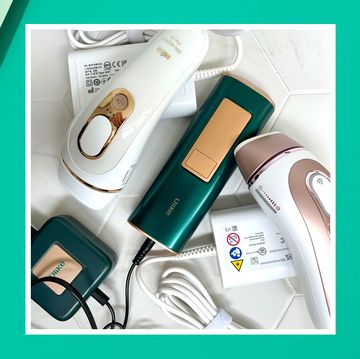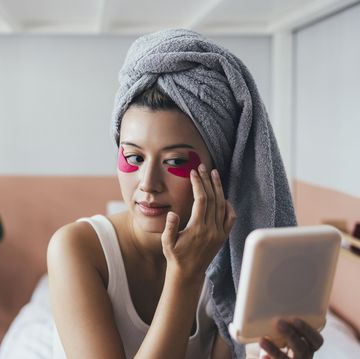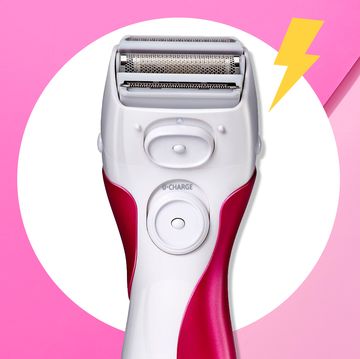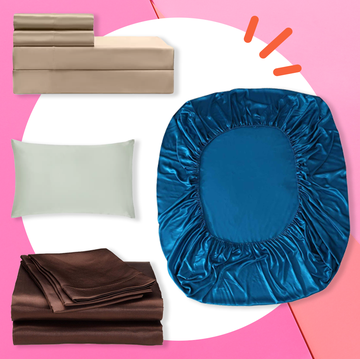Does your get-healthy mission include your eyes? It may after you hear this terrifying story about a woman who went blind after keeping her same contacts in for six months. According to the Daily Mail, a student in Taiwan kept disposable contacts in for six months, and an amoeba ate away at her eyes.
OK, so we have no idea if this story is true or not, but it's a good reminder that your eyes are not invincible and you need to look after them. "There are very common sense things people should do to look after their eyes," says Richard Shugarman, M.D., F.A.C.S., a professor of ophthalmology at the University of Miami and spokesperson for the American Academy of Ophthalmology. Here, a few mistakes that can have horrible consequences (with or without amoebas):
Playing Racquet Sports Sans Protection
Activities like tennis and racquetball can do major damage if you're not careful. "Some sports have high instances of eye injuries, and virtually all of them could be prevented by wearing the appropriate protective polycarbonate eyewear," says Shugarman. The bones around your eye usually help protect it from impact, but a small object like a ball can hit the eye directly.
Wearing Your Contacts Too Long
"I've personally seen permanent scarring and loss of vision from wearing contacts too long," says Shugarman. It's tempting to stretch the wear of your contacts, either because it's more convenient or you don't want to spend the money on a new batch. Here’s the first issue: Contacts sit on top of your corneas, which don't have blood vessels to bring oxygen to them. Your tears are tasked with that job instead, but they can't reach your corneas as well with the contacts acting as a shield. Next, just like your teeth, your contacts form a film around them that will build up if they're not cleaned regularly. This buildup can also block the flow of oxygen to your corneas. The end result is that, due to a lack of sufficient oxygen, your corneas may break down and become more vulnerable to germs.
Depending on the type of contacts you have, you'll have different guidelines for how often they should be removed or cleaned. No matter what they are, follow them. And even though the story about the Taiwanese woman who went blind may not be totally factual, it's based in reality. "When you wear contacts too long, you're in danger of a serious infection that can risk your eyesight. The effects may not be reversible," says Shugarman.
Rubbing Your Eyes
"This is probably the most common bad thing people do to their eyes," says Shugarman. "They ignore the fact that if your eyes are bothering you, there's a reason." If something is stuck on the surface of your eye and you rub it, it's just going to go deeper and you'll have to see a doctor. Plus, rubbing your eyes can cause tears in your cornea, which can lead to infection.
So Resist the urge rub and let your eyes do their thing: When you blink, tears will probably wash the debris away. If that doesn't work, use over-the-counter eye drops to flush your eye out until it returns to normal. Still feeling irritated? Give your eye doctor a call so he or she can advise you via phone or ask you to come in for professional treatment.
Doing DIY Projects Without Goggles
It seems harmless, but taking on home improvement tasks without goggles can result in an E.R. visit. "I've seen injuries where someone was hammering metal on metal and a piece came off and flew into their eyes, or the eyes of someone nearby," says Shugarman. This kind of work creates little particles of material that come off at a high velocity, which is what allows them to penetrate the eye. "When you're at Home Depot picking up your hammers and nails, pick up a pair of safety glasses as well," recommends Sugarman.
Using a Tube of Mascara for Too Long
Yep, these babies should come with an expiration date. "Your makeup is most likely contaminated with things that can affect your eyes," says Shugarman. Eyelashes, pretty as they are, are packed with germs. So each time you swipe your lashes with mascara and put the brush back into the tube, you're just spreading around bacteria that can harm your health. "Throw out your eye makeup every three months to be safe," says Shugarman. Another don't: using your fingers to apply eye shadow. Unless you're washing your hands constantly throughout this process, it’s time be a grownup and get some makeup brushes.
MORE: How Germy is Your Makeup?
Leaving Your Sunglasses at Home
If you get to the beach and realize you forgot your sunnies at home, stop by a drugstore and grab a pair. Even if you don't look directly at the sun, the glare bouncing off the waves and sand can result in photokeratitis aka sun blindness. Essentially, it's like giving your corneas a sunburn. This painful condition can lead to a temporary (and surely traumatic) loss of vision. When shopping for sunglasses, go for big lenses since they'll offer the most surface protection (bonus: you'll feel extra glamorous).
"You also need to be protected from both UVA and UVB rays, because they're both carcinogenic," says Shugarman. Repeated eye exposure without sunglasses can lead to longer-lasting problems like cataracts, which are the leading cause of vision loss, or even skin cancer on your eyelids. Bottom line: Use your shades as much as possible!
MORE: What Staring at a Screen All Day REALLY Does to Your Eyes
Wearing Your Contacts in Water
Whether it's the ocean, a hot tub, or the shower, avoid exposing your contacts to any kind of water. "This also goes for storing your contacts in water instead of sterile saline solution," says Shugarman. "Water is a breeding ground for the type of parasites that can, in severe cases, lead to vision loss." Must we warn you about amoebas again?
Not Visiting the Eye Doctor When Something's Wrong
If something is up with your eyes, even if it seems small, it's crucial to get in touch with your eye doctor as soon as possible. "So many things that go wrong in the eye are easily correctable at first, but the longer it goes on, the harder it is to treat," warns Shugarman.
For example, he recently treated one woman who went blind in one eye on a Friday, but didn't see him until Sunday. She had an issue with her retina, which is the light-sensitive tissue that lines the back of our eyes. "If she came in sooner, we may have been able to help. It breaks my heart to sit there and say, 'There's nothing we can do.'" Be on the lookout for redness, burning, blurred vision, or pain, especially if it's sudden and isolated to one eye. And if you feel the slightest discomfort, call your doctor and explain what’s going on.
MORE: Preserve Your Eyesight













